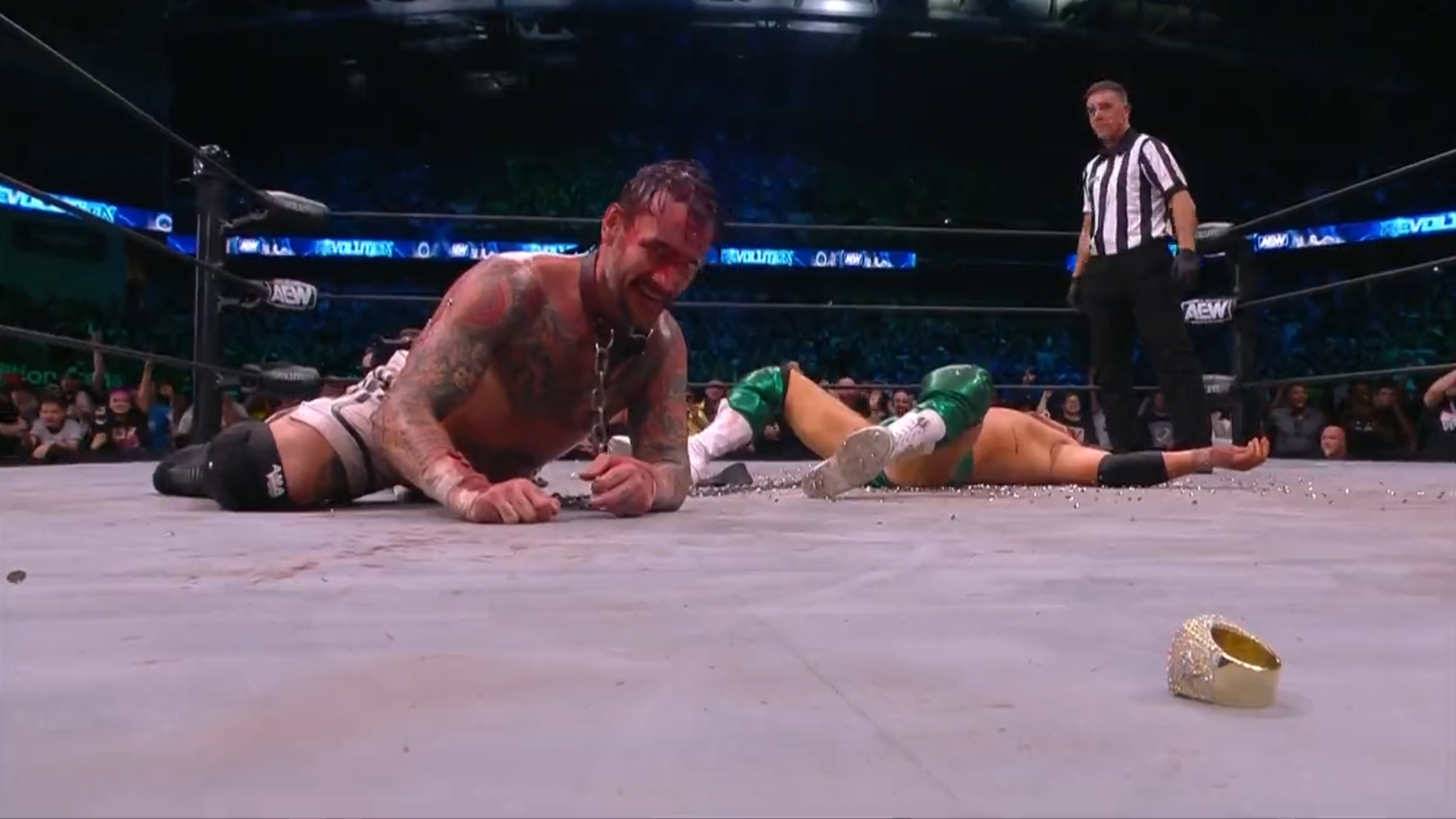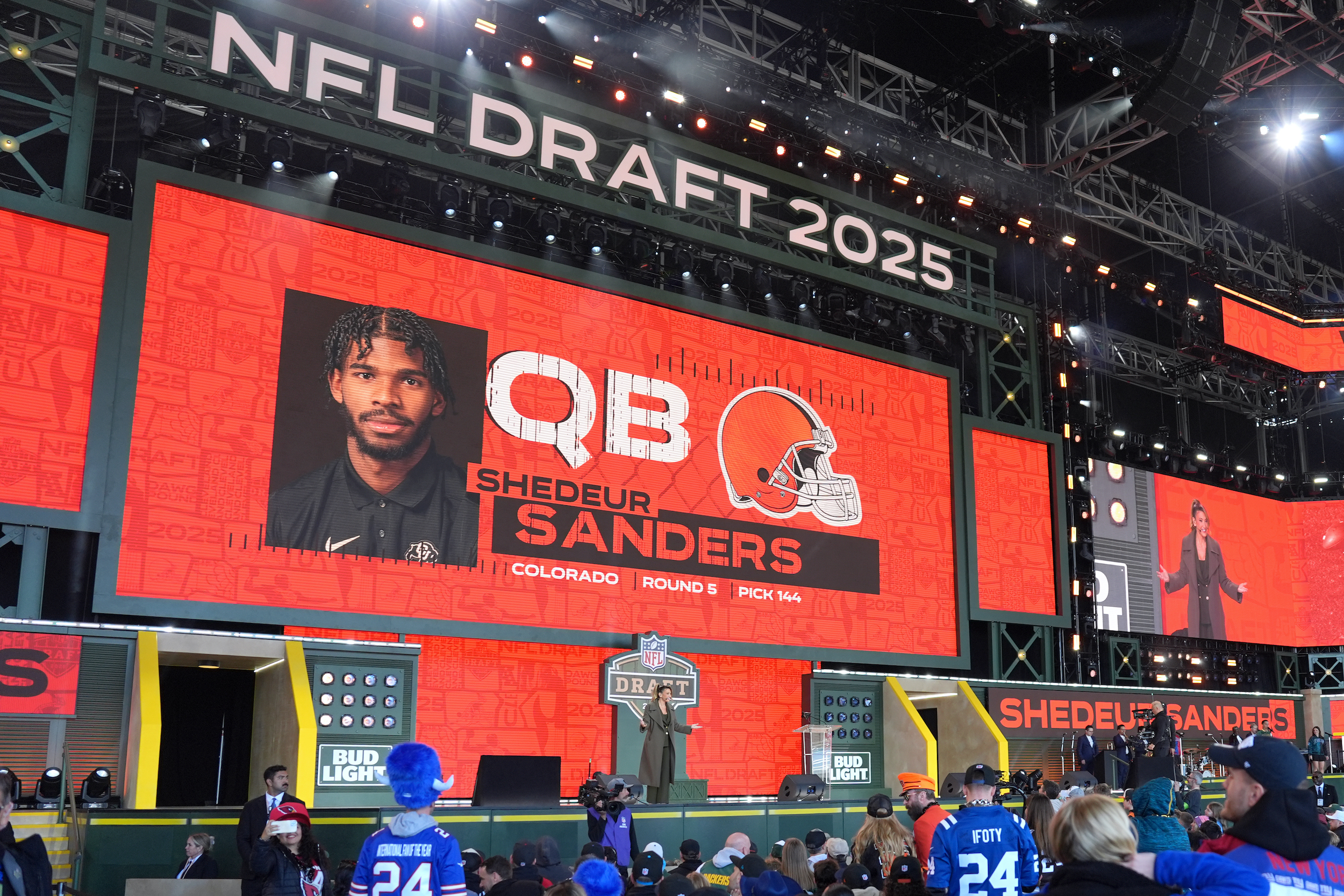I tend to believe that more is more when it comes to products that try to entertain me. If I pay $60 for a video game, I don't mind playing through some filler content that pads out the runtime. If I pay $20 for a movie ticket (which, god help me, I did on Friday), getting almost three entire hours of Robert Pattinson brooding through heavy black eye makeup feels like more bang for my buck than a tight 90 minutes. And if I'm shelling out for a pro wrestling pay-per-view, rather than a neat and tidy eight-match card that's over at 10:30, I'd almost always prefer an overstuffed affair that seemingly tries to burn out its audience with a never-ending succession of show-stopping matches.
That's what AEW's Revolution—the wrestling company's first PPV of 2022—did on Sunday. Across 12 matches and nearly five hours, it took the act of watching hot people climb ladders or slap each other on the chest or bleed profusely from the forehead and turned it into a test of endurance. And though there is perhaps a better-paced version of this show lost forever in the pages of company President/CEO Tony Khan's notebook, I have to admire its sheer determination not to leave any top talent unused or any table unbroken, as it ignored the concept of diminishing returns by trying to fit enough great matches for two PPVs into one night.
The Youtube-streamed preshow alone—almost always a spot for a bunch of hype videos and one overlooked match—would have made for a strong opening hour behind the paywall. Not only did it feature one of the company's most enticing youngsters in the cold-hearted handsome devil HOOK, but it also led into the main card with a 17-minute banger of a trios match involving some of the most athletic, technically sound, and theatrical men in the company. Putting this on the preshow was like setting out whole-ass donuts as free samples at the grocery store, and it set the stage for an event that struggled to contain all of its wildest, maximalist impulses.
The first four matches on the main card were all awesome in their own way. With the crowd behind him and as amped up as they'd be all evening—partially as a function of their own upcoming exhaustion—perennial underdog Eddie Kingston delivered an early emotional high with a win over one of AEW's best-known talents in Chris Jericho. An all-action three-way tag team title match followed, in which division cornerstones the Young Bucks maintained their flawless batting average of great matches at AEW PPVs. Then there was a six-man ladder match with a bunch of gigantic dudes, and it was delicious. And fourth on the main card, and seventh on the night, the undefeated, unpolished star Jade Cargill made a short title defense most memorable for the shocking, intimidating kiss of death at its start.
AYO? #AEWRevolution pic.twitter.com/5NefmfEOxO
— AEW Out Of Context (@zerocontextAEW) March 7, 2022
The show had been nearly flawless up to this point and seemed on the road to being one of the best of all time. And then it got ... not worse exactly, but weirder, and more demanding. The next match was the most anticipated one on the whole show—the "dog collar match" between MJF and CM Punk, who'd spent many weeks crafting a story of an angry, obsessive former fan and an older, wiser reformed heel. Their 27-minute collision in Orlando, which opened with Punk coming out to an AFI song he used as an entrance theme a long, long time ago, was everything it was advertised to be. That means it was ridiculously bloody, unabashedly melodramatic, unavoidably homoerotic, and ultimately satisfying.
While for some people I'm sure this will be Match of the Year, it was not exactly the kind of fantasy I most enjoy from pro wrestling. At some point around the 20-minute mark, when you're watching two blood-drenched men, connected by a chain around their necks, try to avoid slamming into thumb tacks on the ground, you might start to question what exactly it is you want to see. That the Punk/MJF story also dealt with such serious topics as anti-semitic bullying, and whether being a good person means extending a hand to those who have done unconscionable things, made it greater as theater but lesser as escapist entertainment. It's not a coincidence that this was the first match that drew long stretches of silence from the crowd. And there were still four matches to go.
.@CMPunk sacrificing his own injured knee to deliver that vicious move to @The_MJF! #AEWRevolution is LIVE on PPV right now! Available on @BleacherReport & @FiteTV (Int.) pic.twitter.com/E5FGuhVezh
— All Elite Wrestling (@AEW) March 7, 2022
From there, the PPV ran into its first undeniable flaw, which was an underwhelming women's title match that many wrongly thought would bring about a new champion in Thunder Rosa. Instead, a bullshit interference-heavy finish kept the crowd relatively quiet and made the match seem like it was mostly meant to set up a future title win in Rosa's hometown of San Antonio. And in the other most-hyped match on the card, AEW ran into an issue of pacing, as Jon Moxley and Bryan Danielson had a brawl that I'm going to need to watch again with a fresh mind. On its own terms, it was a violent clash of great wrestlers exhausting themselves trying to incapacitate the other. But coming so soon after the Punk-MJF match, it felt like a mind-numbing continuation of that bloody ordeal—serious men having a serious fake fight, again for over 20 minutes; something to be endured rather than enjoyed. While this one, too, ended with an emotional peak in the unexpected appearance of William Regal, the crowd's fatigue was palpable and it's clear to me in retrospect that Mox/Danielson and Punk/MJF should have been placed as far away from each other on the card as possible.
The show ended nicely. The "cool-down" before the main event was anything but—a wild, chaotic, and enjoyably tough-to-follow trios scrap that went all over the building and climaxed with Sting doing a balcony fall through an abstract sculpture of tables.
STING IS 62 YEARS OLD 😱#AEWRevolution
— B/R Wrestling (@BRWrestling) March 7, 2022
(via @AEW)pic.twitter.com/xl2ZL8aBH3
And finally—finally!—in a main event that had its work cut out to live up to all that came before it, AEW champ "Hangman" Adam Page kept his belt against Adam Cole in what to me was the ideal PPV championship match. The audience got back into it in the early going by playing off the shared name in the matchup ("Let's go Adam/Adam sucks!"), and the well-placed big moves and big counters kept them engaged throughout. It was nothing that we hadn't seen from either of these men before, but its ability to effectively provide simple thrills made it a perfect, uncomplicated capper to a complicated night.
Precision marksmanship from @adamcolepro to counter the champion! #AEWRevolution is LIVE on PPV! pic.twitter.com/Wb5D36vdKD
— All Elite Wrestling (@AEW) March 7, 2022
The blindingly bright spectacle that was this show—coupled with last week's news that their next PPV, in Vegas over Memorial Day weekend, already has their highest-grossing ticket sales yet—further cemented AEW as something more than just an alternative to WWE. Given, too, how many of the company's "homegrown" stars created some of the show's best moments, and how the ex-WWE talents indulged a style of wrestling unlike anything they did for their old employer, making comparisons between the two promotions feels less important than ever.
Still, one key difference stands out to me in the aftermath of Revolution. While WWE streams over a dozen "premium live events" per year, AEW has diligently stuck to just four pay-per-views annually, even as it continues to sign more and more top-of-the-card performers. I like that schedule because it's easier on my wallet and makes the big shows feel more special. But Revolution showed that growing a company's roster without growing its schedule is a tricky task, forcing AEW to either exclude major players from its most prestigious stages or overload the card to give everybody their moment in the spotlight. They chose the latter on Sunday night, and it worked out well enough. Certainly no customer finished the show feeling shortchanged. But if every AEW PPV becomes this kind of marathon, at some point a night will come where the pot boils over and leaves a sloppy, undercooked mess.






